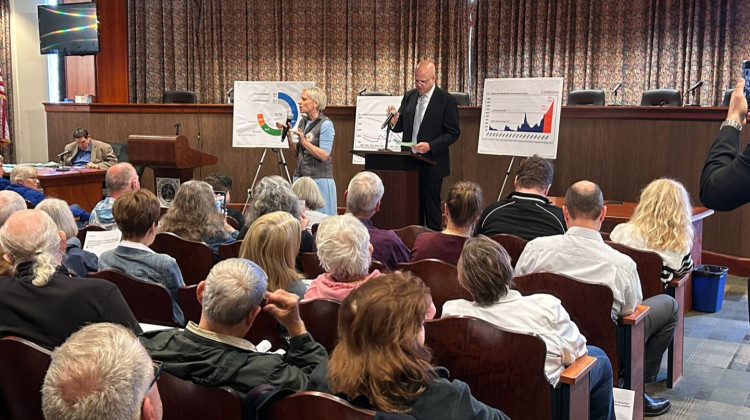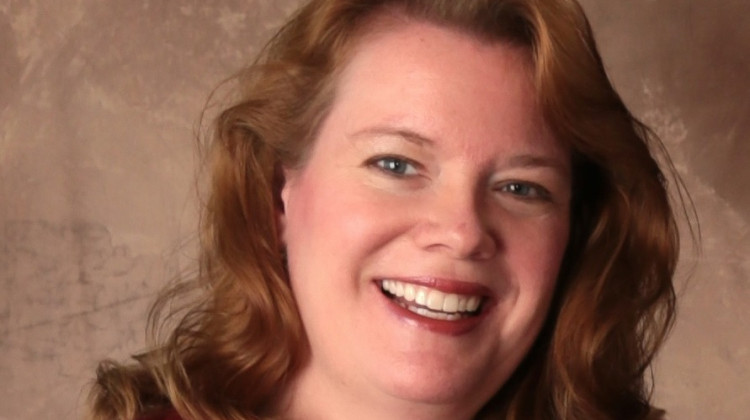
Indianapolis Mayor Joe Hogsett accepts a gift from Cora Gordon (clapping, right) and other members of Youth Power Indiana, which pushed for a city-county climate resolution earlier this year.
Nick Janzen/IPB NewsMayors and public officials from 18 Indiana communities, as well as environmental advocates, business leaders, and young people met in Indianapolis Wednesday to talk about ways Indiana can adapt to impacts from climate change at the second annual Climate Leadership Summit.
Jim Poyser, the executive director of Earth Charter Indiana and the event’s organizer, says he sees bipartisan support on the local level for action on climate change.
“Now, that makes me happy, because I’m tired of thinking about party. I’m tired of wondering what somebody’s ideology is,” says Poyser.
Poyser says since the first Climate Leadership Summit last year, three Indiana towns have passed youth-led climate resolutions: Carmel and Lawrence, which have Republican mayors, and Indianapolis.
Indianapolis Mayor Joe Hogsett says how well cities prepare for climate change will determine their future success.
“We are not exempt from the impacts our changing climate bring,” Hogsett says. “No one is.”
He announced a plan to evaluate Indianapolis' carbon footprint, as well as its vulnerability to natural disasters.
The Sustainability and Resilience Action Plan is essentially a series of requests from the city, to gather data about environmental issues as well as ideas on how to address them. Hogsett says he hopes to lay the groundwork for long-term protections.
Jesse Kharbanda is executive director of the Hoosier Environmental Council. Kharbanda says the approach is holistic, and holds an important focus on mitigation and adaptation.
But he says it’s important to note that for now, it’s just a plan.
“Plenty of cities have sustainability plans, and many cities have climate action plans," Kharbanda says. "But the real question is, ‘To what extent are they actionable?’”
Kharbanda says for good ideas to become public policy, it will prove crucial to have strong leadership from the mayor.
Scientists from Purdue and Indiana universities said during presentations that local impacts of a changing climate include the number of days Indiana experiences above 90 degrees jumping from 20 to 74 by 2050; and that the Indiana climate could look more similar to that of east Texas by 2070.
Cora Gordon, who is 16 years-old, helped pass the Indianapolis climate resolution, which calls for carbon neutrality in the city by 2050. She says the climate resolutions adopted around the state are a message directly from Hoosiers.
“Once we go up higher, once we talk to state people and show them that all these cities have passed climate resolutions, what the people of the state want, it’s what the people of the country want, and so I think that’s definitely something that politicians should keep in mind,” Gordon says.
Logansport Mayor Dave Kitchell says unlike Indianapolis and Fort Wayne, many small communities in Indiana don’t have the resources to invest in big, climate-friendly projects.
“We’re the crossroads of America,” Kitchell says. “But until we’re going to be the crossroads of fiscal sustainability and climate sustainability, we’re not going to convince the majority of the people in this state that this is what we have to do.”
Janet McCabe, a senior law fellow at the Environmental Law and Policy Center and a former Environmental Protection Agency assistant administrator under President Barack Obama, says clean energy and energy efficiency are two areas where municipalities can get the most bang for their buck on climate investments.
“It makes your houses more comfortable, it increases their value, it creates local job opportunities that can’t be imported,” she says.
McCabe says she’s heartened by the action from local leaders across the state on climate, which impacts people’s daily lives, from their health to their pocket books.
“These are people whoa are on the ground now, doing things in their communities to make sure their communities are prepared for the environmental change that we know is going to happen,” McCabe says.
Representatives from Indianapolis, South Bend, Fort Wayne, Goshen, Logansport, Noblesville, North Vernon, Whiting, Gary, Kokomo, Crawfordsville, Bloomington, Muncie, Lafayette, Evansville, Angola, West Lafayette, and Columbus attended the summit.
Drew Daudelin contributed to this report.
 DONATE
DONATE







 Support WFYI. We can't do it without you.
Support WFYI. We can't do it without you.